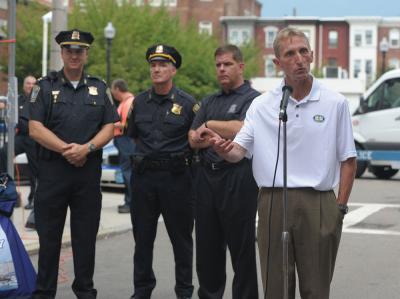August 13, 2015
 BPD Commissioner William Evans, right, wants a ‘methodical’ approach to body cameras. Photo courtesy Mayor’s Office
BPD Commissioner William Evans, right, wants a ‘methodical’ approach to body cameras. Photo courtesy Mayor’s Office
As Boston’s public officials discuss an ordinance that would mandate body cameras on active-duty police officers, the public has expressed support and the city’s top authorities have been advocating a measured approach, saying that the top priority is continuing support for officers and the public.
The issue took center stage at a City Council hearing last Wednesday as Councillor Charles Yancey, the sponsor of the ordinance, Mayor Martin Walsh, Police Commissioner William Evans, activists, and members of the general public offered their views.
“Cameras should be a neutral party in any conflict,” said Yancey, “protecting the public as well as police, who may be cleared of wrongdoing by video footage.
The proposal would require all on-duty field officers, with the exception of those working undercover, to wear cameras on their lapels. Officers would be required to ensure that the cameras are turned on while they are interacting with the public and evaluating criminal activity, unless members of the public request that they not be filmed.
Controversial police-involved shootings across the country have highlighted tensions between community members and local police forces.
Walsh, Evans, and some of Yancey’s colleagues on the council responded cautiously to the proposal.
Evans said that an evaluation of the program, which is expected to cost $3 million, should move “slowly” and “methodically.” He noted that there is still uncertainty regarding cost, constitutionality, privacy limitations, the admissibility of camera footage, and the possible impact on police-community relations.
Evans later spoke to the Boston Herald about a separate concern of the department: the actions of camera-wielding onlookers who might get in the way of police actions. He said he would support a law dictating the amount of space that would be set up between officers and private citizens who come onto the scene.
Nonetheless, Walsh and Evans “are open to looking at whether body cameras for Boston police officers would be a valuable investment in our police force,” said Bonnie McGilpin, a spokeswoman for the Mayor’s office. “But they believe that body cameras are only one tool in police work, and do not address the fundamental problems of inequity in our communities.”
Segun Idowu of Mattapan, a co-organizer of the Boston Police Camera Action Team, the citizen group that crafted the legislation, agreed that cameras alone would not repair systemic disparities.
“What we have presented here today is not the solution, but it is a solution,” Idowu testified.
Each resident offering testimony at the hearing supported introducing body cameras into the police force.
Yancey praised the current relationship between the Boston police force and the community, which has been fraught in the past. However, he testified, “It’s not perfect, none of us are perfect, and on occasion, there are opportunities that exist where individuals may abuse their authority. I don’t believe that happens in the city of Boston, but the possibility always exists.”
When asked by the Reporter for an interview with Evans regarding citizen filming, the department said he was unavailable, but made reference to an arrest on Summer Street on Aug. 3, during which officers attempting to take a man into custody were reportedly pushed to the ground and kicked in the chest. Officers noted that despite requests for assistance directed at the gathering crowd, many instead filmed the altercation.
While the department is not questioning the public’s legal right to carry and use cameras, “the issue of us being filmed comes down to a common-sense approach,” said spokesman Lt. Michael McCarthy.
City Councillor Tito Jackson talked about the constitutional perspective, saying the line is clear: “The public should have the right to film interactions with the police as long as they are not preventing police from doing their jobs.”
On Monday, the mayor weighed in, telling reporters in Roxbury that filming police officers and mandating body cameras should be treated as two distinct issues. “I’m going to have a conversation with Commissioner Evans,” Walsh said. “I think he’s a little concerned with people being too close to an incident. So it’s something that we’re going to have to look at.”
Boston is one of only 4 of the 25 largest US cities that have yet to adopt police body cameras, according to Carol Rose, the executive director of the American Civil Liberties Union of Massachusetts. Boston’s position as a technologically forward city was a compelling reason to move forward with the program, she said.
Waiting on other cities’ pilot programs may not be the best guide for the cameras’ effectiveness, said Councillor Jackson, since “the way we do things in Boston… is pretty unique.”
Community policing was new when the city began employing it, Jackson said, but employing new technology and methods are what make Boston’s police force an example to the rest of the country. “We deserve to employ the latest and greatest technology,” he told the Reporter.
A less-recent innovation than body cameras, dashboard-mounted cameras have also been encouraged by supporters of the ordinance.
Dashboard cameras were at one time in limited use in Boston police traffic enforcement cars. They were discontinued about five years ago, police said, although they did not specify the reason for their removal. They were not installed in any of the fleet’s new cruisers and are not an element of the proposed ordinance.
A State Police committee is also evaluating potential body and dashboard cameras, both separately and in a combined system, according to department spokesman David Procopio.
“We can see, generally speaking, the benefit of cameras in recording certain types of incidents,” he said. “That documentation is something that will be a benefit to both the community at large and to police officers in terms of maintaining the public’s trust,” he said. “But the big issues that need to be weighed against that are going to be cost and logistics.”
Topics:


